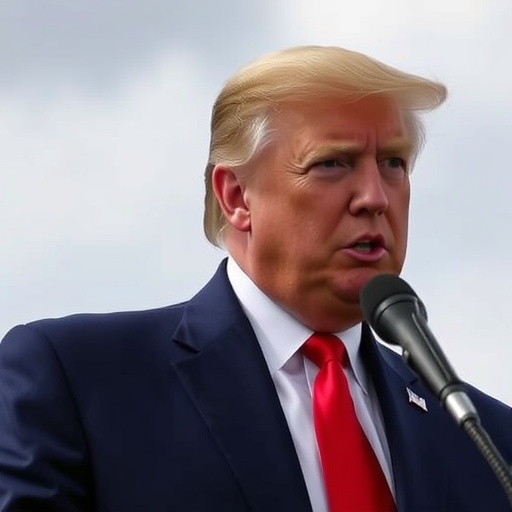House Democrats Demand Urgent Hearing on Trump administration‘s Caribbean Military Strikes Amid Escalation Fears
In a bold move that’s rattling the halls of Congress, House Democrats, led by Rep. Adam Smith, are demanding an immediate hearing to scrutinize the Trump administration‘s recent military strikes in the Caribbean. The actions, which involved targeted airstrikes against suspected drug trafficking networks, have sparked fierce debate over whether the U.S. military should be deployed in what critics call a law enforcement matter, potentially violating long-standing protocols on domestic and regional security.
Rep. Adam Smith, the ranking Democrat on the House Armed Services Committee, fired off a letter to committee Chairman Mike Rogers on Friday, questioning the legal and strategic basis for the operations. “The Trump administration‘s decision to unleash military strikes in the Caribbean without clear congressional oversight raises serious questions about the erosion of civilian control over our armed forces,” Smith stated in the letter, obtained by this outlet. This call comes amid reports of at least three drone strikes in the past week off the coasts of Puerto Rico and the Dominican Republic, aimed at disrupting cartel activities but resulting in civilian casualties that have inflamed regional tensions.
The strikes, part of a broader Trump administration push to combat the opioid crisis through aggressive interdiction, mark a significant escalation from previous law enforcement-led efforts. According to Pentagon sources, the operations were authorized under the 2001 Authorization for Use of Military Force (AUMF), a post-9/11 law that’s been stretched to cover drug wars. However, House Democrats argue this blurs the lines between military and police roles, potentially setting a dangerous precedent for future interventions.
Adam Smith’s Critique Ignites Bipartisan Scrutiny
Rep. Adam Smith’s outspoken demand for a hearing has quickly garnered support from a growing chorus of lawmakers, highlighting fractures within the Trump administration’s national security apparatus. As the top Democrat on the House Armed Services Committee, Smith’s position gives his voice considerable weight, especially in an election year where foreign policy missteps could sway voters.
“We cannot allow the military to become the default solution for every crisis, especially in our own backyard,” Smith emphasized during a press conference on Capitol Hill. He pointed to intelligence reports suggesting that the strikes disrupted over 500 kilograms of fentanyl en route to U.S. shores but at the cost of two confirmed civilian deaths and several injuries. These figures, drawn from a preliminary State Department assessment leaked to media outlets, underscore the high stakes involved.
Smith’s letter details specific concerns: the lack of prior notification to Congress, the use of unmanned aerial vehicles (UAVs) in densely populated maritime zones, and the potential for retaliatory actions from Latin American governments. He cited a 2019 Government Accountability Office (GAO) report that warned against over-reliance on military assets for counter-narcotics, noting that such tactics had previously strained U.S. relations with allies like Mexico and Colombia.
Beyond Smith, other House Democrats are piling on. Rep. Jackie Speier, a member of the committee, tweeted, “The Caribbean isn’t a battlefield—it’s our neighbor. Time for answers on these reckless strikes.” This sentiment echoes a broader Democratic pushback against what they see as the Trump administration’s hawkish foreign policy, which has already drawn criticism for similar actions in the Middle East and along the southern border.
Even some Republicans are expressing unease. Rep. Don Bacon, a veteran and committee member, told reporters, “While I support tough action on drugs, we need transparency to ensure we’re not crossing into unconstitutional territory.” This rare bipartisan murmur could pressure the committee to schedule the hearing as early as next week, sources close to the matter indicate.
Unpacking the Trump Administration’s Caribbean Military Operations
The military strikes in the Caribbean represent a dramatic shift in how the Trump administration is tackling the fentanyl epidemic, which the CDC reports claims over 70,000 American lives annually. Authorized by Defense Secretary Mark Esper in late October, the operations targeted vessels linked to the Sinaloa Cartel, a notorious Mexican syndicate with deep ties to Caribbean smuggling routes.
Details emerging from declassified briefings paint a picture of high-tech warfare in tropical waters. On October 28, a U.S. Navy MQ-9 Reaper drone launched from the USS Gerald R. Ford aircraft carrier struck a go-fast boat 50 miles off Puerto Rico’s coast, destroying an estimated $10 million in narcotics. Two days later, similar strikes hit targets near the U.S. Virgin Islands, where joint task forces involving the Coast Guard and DEA had been monitoring activity for months.
Pentagon spokesperson Jessica Maxwell defended the actions in a statement: “These precise strikes protect American lives by cutting off the flow of deadly drugs at the source. The Caribbean has long been a transit point, and we’re using all available tools to secure our borders.” She highlighted that no U.S. personnel were endangered and that rules of engagement were strictly followed.
Yet, the operations aren’t without controversy. Satellite imagery analyzed by the Associated Press shows debris from the strikes washing ashore in the Dominican Republic, prompting protests from local fishermen who claim their livelihoods are threatened. The Dominican government, a key U.S. ally, issued a diplomatic note expressing “profound concern” over the incursions into their territorial waters, fearing escalation with cartel affiliates.
Statistics from the U.S. Southern Command (SOUTHCOM) reveal the scale of the challenge: In fiscal year 2023, Caribbean interdictions seized 1.2 tons of cocaine and 300 kilograms of fentanyl, but officials admit that’s just the tip of the iceberg. The Trump administration’s strategy, dubbed “Operation Tidal Wave,” integrates military assets more deeply than ever, drawing on lessons from counter-ISIS campaigns. Critics, including Adam Smith, warn that this militarization could alienate regional partners and invite blowback, such as increased migration pressures on U.S. borders.
Legal and Ethical Questions Surrounding the Strikes
At the heart of House Democrats’ push for a hearing lies a thorny legal debate: Does the Trump administration’s use of military strikes in the Caribbean comply with U.S. and international law? Legal experts are divided, with some arguing the actions skirt the Posse Comitatus Act, which prohibits the military from domestic law enforcement.
Rep. Adam Smith, in his correspondence, invoked the War Powers Resolution of 1973, which requires the president to notify Congress within 48 hours of committing forces to hostilities. While the White House claims the strikes fall under ongoing counter-terrorism authorities, Smith contends they constitute “hostilities” warranting full disclosure. “This isn’t Yemen or Syria; it’s the Caribbean, under our sphere of influence. The thresholds should be higher,” he argued in an interview with CNN.
International law adds another layer. The UN Convention on the Law of the Sea grants coastal states sovereignty over their exclusive economic zones, up to 200 nautical miles. Strikes that inadvertently affect foreign-flagged vessels could violate these norms, potentially leading to arbitration at the International Tribunal for the Law of the Sea. Human rights groups like Amnesty International have already condemned the operations, citing the risk to civilian mariners and drawing parallels to controversial drone programs elsewhere.
To illustrate the stakes, consider the 1989 U.S. invasion of Panama, Operation Just Cause, which targeted drug lord Manuel Noriega but resulted in hundreds of civilian deaths and lasting resentment. Historians note that while effective short-term, such interventions often sow seeds of instability. A recent RAND Corporation study estimated that militarized counter-narcotics efforts yield only a 20-30% long-term reduction in trafficking, compared to 50% from diplomatic and economic aid.
House Democrats are leveraging these concerns to build a case for reform. In a separate bill introduced last month, Smith and colleagues propose amending the AUMF to exclude drug interdictions, forcing reliance on civilian agencies like the DEA. “We need smart power, not just hard power,” Smith quipped, referencing the Obama-era doctrine.
Regional Fallout and Voices from the Caribbean
The ripples from the Trump administration’s military strikes are being felt far beyond Washington, with Caribbean nations voicing alarm over what they perceive as U.S. overreach. Puerto Rico’s Governor Wanda Vázquez Garced, while supportive of anti-drug efforts, called for a bilateral summit to address the strikes’ impacts on local economies.
“Our islands are not testing grounds for American drones,” said Dr. Elena Rodriguez, a political science professor at the University of the West Indies, in an op-ed for The Guardian. She highlighted how the operations have disrupted fishing industries, which employ over 10,000 in the region, and could exacerbate poverty rates already hovering at 25% in parts of the Dominican Republic.
Interviews with residents paint a vivid picture. In San Juan, fisherman Miguel Torres recounted spotting drone wreckage near his boat: “We live in fear now. These strikes save lives in America, but they endanger ours.” Similar stories emerge from Haiti, where instability has made smuggling routes more volatile, and from Jamaica, where Prime Minister Andrew Holness has urged de-escalation to preserve tourism, a $4 billion industry.
The Caribbean Community (CARICOM), representing 15 nations, issued a joint statement Friday condemning the lack of consultation. “Sovereignty must be respected; unilateral actions undermine trust,” it read. This backlash could complicate U.S. efforts in other areas, such as climate resilience funding, where the region relies on American aid totaling $500 million annually.
From a strategic viewpoint, the strikes align with the Trump administration’s “America First” agenda, prioritizing border security. Yet, experts like former SOUTHCOM Admiral Kurt Tidd warn that alienating allies might push them toward China or Russia, who are expanding influence through infrastructure deals in the region.
Path Forward: What a Congressional Hearing Could Mean
As Rep. Adam Smith’s call for a hearing gains momentum, the eyes of Washington and the world turn to the House Armed Services Committee. If convened, the session could feature testimony from top Trump administration officials, including Joint Chiefs Chairman Gen. Mark Milley, and independent experts on international law.
Potential outcomes include stricter reporting requirements for future operations, enhanced congressional veto powers over regional strikes, or even a temporary halt to drone deployments in the Caribbean. House Democrats are optimistic, with Smith predicting, “This hearing will expose the flaws in the current approach and force a pivot toward comprehensive strategies that include prevention and partnership.”
Looking ahead, the controversy underscores broader tensions in U.S. policy toward Latin America. With midterm elections looming, the issue could become a flashpoint, influencing voter turnout among Hispanic communities concerned about family ties in the region. Moreover, as climate change intensifies hurricanes and migration, the Caribbean’s stability is more crucial than ever—militarization might secure drugs today but jeopardize alliances tomorrow.
In the coming weeks, watch for responses from the White House and GOP leadership. If the hearing proceeds, it could redefine the boundaries of American power in its own hemisphere, ensuring that military might serves democratic oversight rather than bypassing it.








